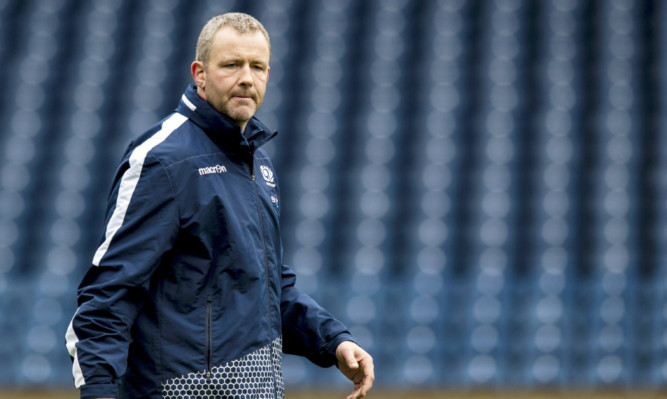Richie Gray has taken a circuitous route to say the least to end up back at Murrayfield, but he’s striving to make a difference to Scotland in the short time he is here.
The former Scotland A lock no relation to the current Scotland lock of the same name was a development manager with the old Border Reivers until that team folded and not retained on the Murrayfield staff at that time.
Instead he became one of rugby’s prominent breakdown gurus, employed as specialist coach by South Africa, but when that deal ended after the World Cup Vern Cotter swept him into the Scotland camp.
It’s just a consultancy job, with no promises beyond this RBS 6 Nations. However Scotland’s improvement in the area over the first two games shows he has having some effect, and the ebullience and enthusiasm of the Gala man remains infectious.
“It was strange I never had any thought about coming back to because the coaching team were all in place,” he said. “Then one thing led to another, I spoke to Vern about a certain area of the game that they wanted to sharpen up a little bit on, and here I am again.
“It’s been fresh because I don’t know most of the players that well. Ross Ford, I was part of the group that moved him from back row to hooker, Greig Laidlaw I signed for the Reivers, John Barclay I coached at Under-18s and Stuart Hogg was with me at the Borders Academy when he was 17, but that’s it.”
However Gray does know all about “the Scottish way” that Cotter is trying to encourage and how the breakdown has a crucial bearing on the modern game.
“It’s like a game of human chess, and it’s become fascinating over the last few years,” he said. “For something that happens 180 times per game in attack and defence, it has to have an effect on the game somewhere so why not look at the detail and train the players around it.
“People always talk about stealing ball, which is the “gold medal”, but there are two other parts, the penalties you can get from being there, and the fight you can have to stop the momentum of the position attack,” he added.
“On average you get 60 to 80 defensive breakdowns per game so if you can slow them up and you can get your hands on the ball or maybe get some penalties, then they have to throw extra men in. An extra man going in there is worth six or seven metres on the field to us.”
With such big gains, you have to be canny, and that’s been his major focus with Scotland a very different team to the Springboks he most recently coached.
“Decisions have been the key thing, you don’t want to be diving into lost causes, that can cause you a lot of problems if you don’t win the ball,” he continued.
“Italy you know what is coming at you, the way they attack, the numbers they put in, who their carriers are and how they present the ball. There are a number of things you look at and then come up with a plan to try to target it.
“Previously in the Six Nations you could see sides going for the turnover at third or fourth phase but now it is pretty much an all-in fight from the first breakdown.”
Scotland won the breakdown against Wales “against three guys I rate as world class” but they’ll have to up their game against Italy.
“I think game by game anyone can take anyone on their day,” he said. “It’s fine, fine margins, if you look at the close scores in the first two rounds, and even the Italy-England game for the first 52 minutes before the (Jonathan Joseph) interception try.”
Gray would only swap thing the Springboks’ system has that Scotland doesn’t.
“Numbers,” he continued. “They’ll have an injury in a position and they’ll look at the five or six below who are all playing Super Rugby.
“We don’t have that and need to get on and bloody fight with what we’ve got. If you look at the recent Under-20 results there seems to be a change there. I think there are really good rugby players in Scotland now and we need to play the Scottish way.
“It is in the Scottish psyche, that sort of guerrilla warfare rugby when you are in the defensive line, when you come out and attack.
“It’s about mentality, work rate and just going for it, trying to make it as difficult to play against as possible. Chaos, panic and confusion – that’s what you have to create for 80 minutes.”
As for the future, Gray remains open minded.
“I don’t know what I’m going to be doing tomorrow let alone five weeks’ time,” he added. “I’ve got this contract, I’ll try to make as big a difference as I can in the amount of time I’ve got and Vern’s been great with that.
“The good thing about Scotland is, it’s a close knit group. They all know what’s going on with each other, there should be no excuses there and the systems have been in a couple of years.
“All you’re looking to do is pick on one or two fine pieces of detail. The pressure for me as a coach is trying to pick the one or two that are going to make the biggest difference.”
